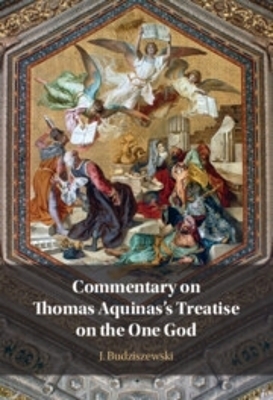
Commentary on Thomas Aquinas's Treatise on the One God
Cambridge University Press (Verlag)
978-1-009-53624-0 (ISBN)
Thomas Aquinas's classic Treatise on the One God is one of the greatest works ever written in the history of philosophy and theology. During the first half of the twentieth century, philosophy of religion was widely viewed as dead, not even a domain of serious questions but only of 'pseudo-questions.' Surprisingly, not only did the supposed corpse rise from the dead, but religion once again became one of the most active fields of philosophical investigation. The time could not be more fitting for a reinvestigation of Treatise on the One God, which opens the massive Summa theologiae. In this unparalleled exploration of the Treatise's penetrating arguments J. Budziszewski explores and illuminates the text with a luminous line-by-line commentary. Supplemented with thematic discussions, this book discusses not only the Treatise itself, but also its immediate relevance to contemporary thought and issues of the modern world. This work fittingly closes the author's series of commentaries on the Summa Theologiae.
J. Budziszewski is a professor in the Departments of Government and Philosophy at the University of Texas, Austin. Besides Thomas Aquinas, Budziszewski's greatest interest is the natural law, in which he is best known for his work on moral self-deception. He has also written widely on virtue, happiness and ultimate purpose, family and sexuality, religion and public life, toleration and liberty, and the unraveling of our common culture.
Commentator's Introduction; Question 1, Article 1: Is it reasonable to think that the reach of our reasoning needs to be extended by divine Revelation?; Question 2, Article 3: Does God exist – is He real?; Question 3, Article 7: Is God completely simple, rather than in some way composite?; Question 4, Article 1: Is God “perfect” or complete?; Question 6, Article 2: Is God the summit or apex of good?; Question 49, Article 2: Granted that God is the supreme good, is He also the cause of evil?; Question 7, Article 1: Is God infinite?; Question 8, Article 1: Is God in all things?; Question 9, Article 1: Is God exempt from every sort of change?; Question 10, Article 2: Is God eternal?; Question 11, Article 3: Is God a single Being? Is there just one of Him?; Question 12, Article 13: Can we gain a loftier knowledge of God by divine grace than by our natural powers of reason?; Question 13, Article 12: Granted that we do not perceive the essence of God, still, can we affirm anything positive about Him?; Question 14, Article 1: Does God know anything?; Question 16, Article 5: Is God, in His own being, truth?; Question 18, Article 3: Is it fitting to call God alive?; Question 19, Article 3: Does God have to will what He wills – is He compelled by necessity?; Question 20, Article 2: Does God love all things?; Question 21, Article 4: Is everything God does characterized by both mercy and justice?; Question 22, Article 2: Does God's providence rule everything, not just things in general but also particular things?; Question 25, Article 3: Is God all-powerful, or omnipotent?; Question 26, Article 3: Is God the beatitude of the beatified, the very blessedness of the blessed ones in heaven?; Commentator's Conclusion: Preamble to What?
| Erscheinungsdatum | 05.11.2024 |
|---|---|
| Zusatzinfo | Worked examples or Exercises |
| Verlagsort | Cambridge |
| Sprache | englisch |
| Maße | 152 x 229 mm |
| Gewicht | 782 g |
| Themenwelt | Geisteswissenschaften ► Philosophie ► Ethik |
| Religion / Theologie ► Christentum ► Kirchengeschichte | |
| ISBN-10 | 1-009-53624-9 / 1009536249 |
| ISBN-13 | 978-1-009-53624-0 / 9781009536240 |
| Zustand | Neuware |
| Informationen gemäß Produktsicherheitsverordnung (GPSR) | |
| Haben Sie eine Frage zum Produkt? |
aus dem Bereich


